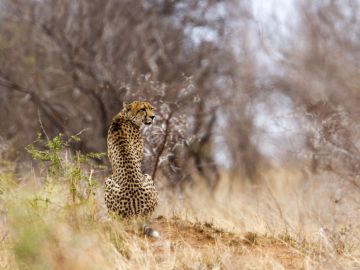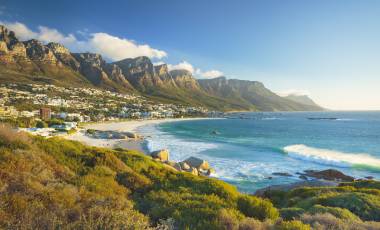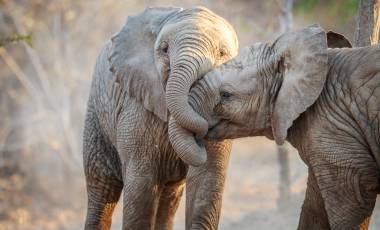I have never been so close to the wildlife, from Addo National park to Harmenus – I been with the nature and the its amazing creatures. This trip is a must go if you want to experience good food, comfortable journey, natural beauties and off course the wild life.

South Africa Safari Holidays
- Home
- South Africa
- Wildlife Holidays in South Africa
South Africa Safari Holidays
South Africa’s Big Five
African Lion: This majestic big cat is arguably the first animal most people imagine when they think of South Africa safari holidays. These social creatures are often found in prides and the females remain in the same pride throughout their lifetime. South Africa is home to a large number of lions and can most often be seen roaming around the Okavango Delta, Masai Mara, Namib Desert, and Etosha, Kruger and Chobe national parks. Kruger National Park boasts the largest number of wild lions, with approximately 2,000 wandering this rich and fertile land in search of prey, that’s almost six lions to every 39 square miles.
Leopard: The most elusive all the animals you might spot on a South Africa safari is the leopard, which is famous for being particularly difficult to track down. These elegant, spotted creatures are solitary in their movements and hunt larger animals such as zebras and antelope. During our South Africa Walking and Wildlife trip, we visit the most advantageous places at Kruger National Park to go in search of the leopard, where you’ll hopefully see them in their natural habitat. They can withstand variable climates and are more often seen lurking in the forest, mountains or deserts.
African Elephant: The largest of the Big Five, the African elephant is a hefty yet graceful animal and can weigh up to an incredible seven tonnes. Kruger National Park is the best place to see elephants on South Africa safari holidays as it is home to the largest population in the world. With over 20,000 elephants roaming the park, you have an excellent chance of seeing them here. The best time to see them at Kruger, is during the country’s dry season when they are thirsty and gather around the waterholes to drink. However, they can also be seen in other parts of the national park throughout the rest of the year.
Rhino: The rhino is another hefty beast that makes up the famous Big Five and is usually spotted plodding around Etosha and Kruger national parks during a South Africa safari. They weigh up to a whopping 7,700 pounds and their horns can grow up to 5ft long, making them the second largest land mammal after the elephant. Witnessing a herd of rhinos thundering across the wilderness is an incredible experience and they can reach speeds of up to 30-40mph, so make sure you don’t get in their way!
African Buffalo: Sometimes mistaken for bulls, the buffalo is considered one of the most dangerous of the Big Five as they have a habit of attacking. On our South Africa holidays safari drives through Etosha, Chobe and Kruger national parks, let you get up close to the African buffalo. You can also see them at the Okavango Delta and it’s a truly humbling experience to watch their behaviour in the wild. The African buffalo tends to live in groups and they mostly eat grass and leaves.
Joyeeta Deb Cape Town & the Garden Route
Robyn Long Cape Town & the Garden RouteThis trip is simply wonderful! It has everything you could ask for- wild animals, amazing culture, wonderful people, beautiful landscapes and stunning food and drink. I have always wanted to go to South Africa and thought this trip was a great way to see so much of it but it has exceeded all expectations.
What is the best time of year to go on South Africa safaris?
The best time to go on a South Africa safari largely depends on what you hope to experience during your trip. Generally, the dry winter months from May to September are considered the best time for game viewing, as animals congregate around waterholes and are easier to spot in the sparse vegetation. This period also enjoys more comfortable temperatures and lower risk of malaria. During these months, game viewing is at its peak, especially in Kruger National Park, where you’re likely to spot the Big Five.
What animals can I expect to see on a safari in South Africa?
South Africa safari holidays offer a diverse array of animals for you to witness in their natural habitats. Among the iconic wildlife that can be spotted on these safaris are the Big Five: lions, leopards, elephants, rhinos and buffaloes. South Africa is also home to a variety of other fascinating creatures like giraffes, zebras, cheetahs, hippos, crocodiles and a wide variety of bird species. The country’s rich biodiversity provides a truly unique experience for wildlife and nature lovers. Exploring South Africa’s stunning landscapes and observing these extraordinary animals in the wild is a memorable and awe-inspiring adventure.
FAQs on South Africa Safaris
When planning a trip to South Africa, it is important that you get the necessary vaccinations to stay healthy and protect yourself from potential diseases. Although there are no required vaccinations needed, we highly recommended to get vaccinated against hepatitis A and typhoid, as these diseases can be contracted through contaminated food or water. Malaria is also a concern in certain regions, so anti-malarial medication may be necessary. Other vaccinations to consider are to protect against are cholera, hepatitis B, rabies and tuberculosis and you’ll also require a certificate for yellow fever vaccinations if you’re travelling from a country with a significant risk of transmission. Consulting with a healthcare provider before your trip is crucial to determine the specific vaccinations and medications you may need.
Travellers visiting South Africa from the UK and most EU states don’t require a visa to enter the country. However, the visa requirements vary depending on the traveller’s nationality. South Africa does offer visa exemptions to passport holders of certain countries, allowing them to enter for a specified period without a visa. It’s essential to check the visa requirements well in advance as they are subject to change. To avoid any issues, make sure you contact your nearest consulate or embassy of the destination you’re visiting.
When deciding how long you’ll need for your safari, remember the duration of your stay will depend on various factors such as your budget, interests and how many national parks or reserves you wish to explore. Typically, a safari in South Africa ranges from a minimum of 15 to 20 days if you want to get the most out of your holiday. For a comprehensive experience, allowing at least 15 days is recommended to visit multiple parks, including Kruger National Park, as well as exploring many of the main sights. This timeframe ensures you have enough time for game drives, relaxation and exploring the diverse wildlife and landscapes that South Africa has to offer.
South Africa is home to many stunning national parks, but if you’re looking for the ultimate wildlife experience, Kruger National Park is a top choice. Established in 1926, Kruger is one of the largest game reserves in Africa, spanning nearly two million hectares. It offers a remarkable diversity of wildlife, including the Big Five, which is made up of the lion, elephant, buffalo, rhino and leopard. You can embark on thrilling safari drives to spot these magnificent animals in their natural habitat, as well as enjoy bird watching, guided bush walks and cultural experiences. With its breathtaking landscapes and abundant wildlife, Kruger National Park is a must-visit destination for nature lovers.
On our safaris in South Africa, beyond the diverse wildlife, you’ll witness many incredible sights. The country’s stunning landscapes comprise rugged mountains, vast savannas, lush forests and striking coastlines. You can also watch captivating sunsets casting golden hues across the horizon, which is particularly breath taking on safari. South Africa’s rich cultural heritage also provides opportunities to visit local villages, interact with indigenous tribes and learn about traditional customs. You’ll have plenty of time to explore Cape Town, hike among the Drakensberg Mountains and visit historical sites.
The Adventure Begins Here
Get regular inspiration straight to your inbox from Exodus’ experts.



